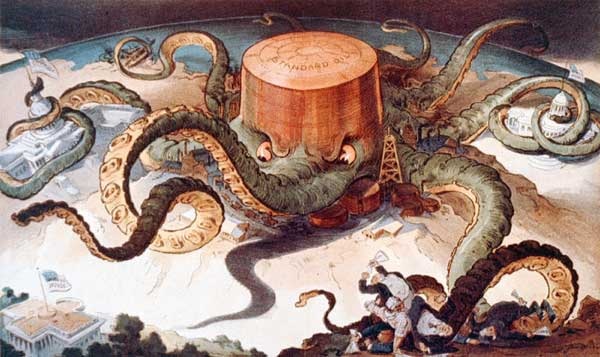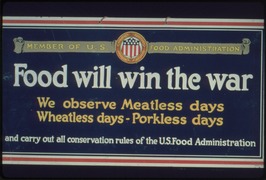With the rise of big business, powerful people, and incorporated industries, corporate power shook the foundation of early America. Prior to the late 19th century, there weren't many businesses that had an overwhelming amount of political, social, and economic control. Along with the businesses that overtook the urban environments came the wealthy individuals that accumulated mass amounts of wealth that were incomprehensible to the average American. Among these businessmen were John D. Rockefeller, dominating oil production, Andrew Carnegie, controlling steel, and Swift and Armour, taking on meat production. The were quite a few others who established large companies that turned into national corporations, such as Henry Heinz, Quaker Oats, and General Electric.

The individuals who composed these companies monopolized the markets and had little to no regulation regarding their businesses. In order to avoid any competition, Rockefeller, for example, would buy any other oil production companies and continuously expand his empire. In addition, many companies would also purchase all companies regarding production. For example, Rockefeller had control of drilling, piping, refining, barreling, distributing, wholesaling, and retailing.
Incorporating a company took on a new meaning for business in America. Our textbook,
Becoming America, describes the new qualities that an incorporated company had; by incorporating a company, it allowed the business to hire, fire, and create contracts, almost like a
person, and it took the risk out of creating a new business by giving the owner protection from personal liability for the company's debts. Considering America hadn't experienced the wrath of corporate power in earlier decades, it's understandable that there weren't any stipulations or regulations on the amount of power one company could exert on the market. The lack of structure allowed the new, power-hungry corporations to completely control the prices of the entire market and to lower their prices drastically, causing the smaller businesses to drive into debt, sell their businesses, or shut down.
Another benefit that the corporate giants inherited was their political power. Many powerful businessmen would ensure that their preferred political candidate would get elected; this would benefit their business because that candidate would usually have the same political interests and would not regulate the big businesses.
Ted Nace, who wrote
Gangs of America, discusses the evolution of corporations and what allowed the elite groups to control the markets. He describes the characteristics of corporations as "superpowers", for example, he talks about the shape-shifting abilities of big businesses that allows them to control all steps of production. Another example is that corporations became immortal, having no limit on the company's lifespan. Lastly, the lack of charters released nearly all limits on size, ownership of assets, and other types of growth. This allowed the companies to completely cover and control all aspects of the market with little to no regulation.

The public had mixed emotions regarding the companies, however, when the consumers realized the companies had monopolized the market, their dissatisfaction grew. This left the consumer trapped and unable to make choices that should be available in a free market. The general population was boxed into buying one company's products at any price. The economy no longer embraced a true capitalist structure and the future did not look much brighter.
The monopolistic business structures and the elite group of wealthy business owners is easily related to the corporations of today. For example, the Federal Reserve, a private bank regulating the economy and funding of the United States, has a full monopoly as the only source of funding for our government, aside from taxes. Similarly, Monsanto is the largest producer of both corn and soy beans with a patent on their seeds. Monsanto has caused dozens of small farmers to go bankrupt by accusing them of stealing the Monsanto seeds and filing huge law suits. This is the case for many farmers in small towns, even if they did not steal Monsanto's seeds and the wind just blew one into their property. The elite group who held the wealth is comparable to the one percent of the population now, who is enormously wealthy and hold a majority of America's wealth. Lastly, one of the most important examples is today's media. There is a small group of six companies, Comcast, News-Corp, Disney, Viacom, Time Warner, and CBS, who control
90% of what we read, watch or listen to today.
While there aren't many people today who realize or care to point out that our illusion of choice is completely false, it is evident that monopolies have never faded out of America's economy. Even if it isn't only one company who is controlling the market, it has become only a very, very small handful. The reality of our corporations is that they haven't changed, there are still very few people benefiting from the mountain of wealth, and we still do not have anything close to a free market economy. With corporate giants squishing and buying their way through any opposition, it allows for minimal competition and a country controlled by corporations.

















